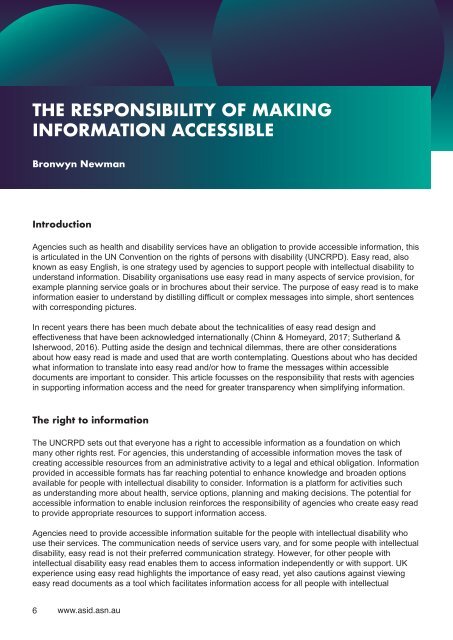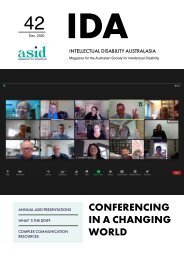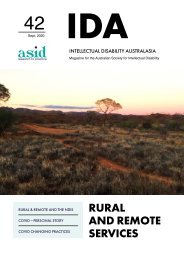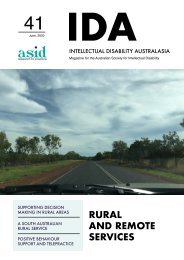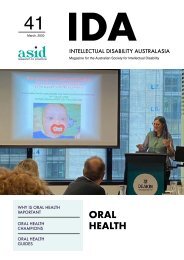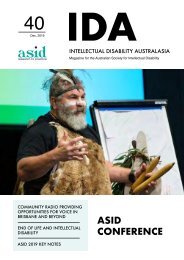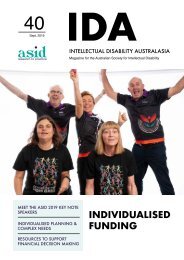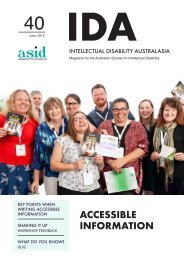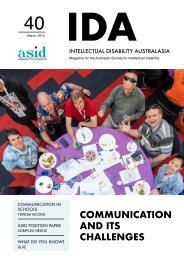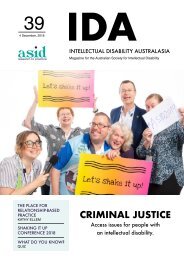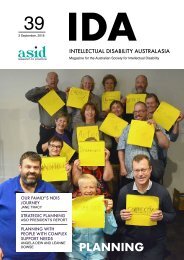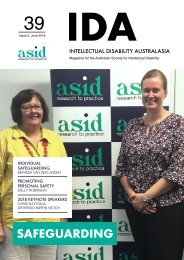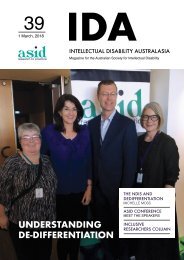IDA Magazine Vol 40 Iss 2 (June 2019)
You also want an ePaper? Increase the reach of your titles
YUMPU automatically turns print PDFs into web optimized ePapers that Google loves.
THE RESPONSIBILITY OF MAKING<br />
INFORMATION ACCESSIBLE<br />
Bronwyn Newman<br />
Introduction<br />
Agencies such as health and disability services have an obligation to provide accessible information, this<br />
is articulated in the UN Convention on the rights of persons with disability (UNCRPD). Easy read, also<br />
known as easy English, is one strategy used by agencies to support people with intellectual disability to<br />
understand information. Disability organisations use easy read in many aspects of service provision, for<br />
example planning service goals or in brochures about their service. The purpose of easy read is to make<br />
information easier to understand by distilling difficult or complex messages into simple, short sentences<br />
with corresponding pictures.<br />
In recent years there has been much debate about the technicalities of easy read design and<br />
effectiveness that have been acknowledged internationally (Chinn & Homeyard, 2017; Sutherland &<br />
Isherwood, 2016). Putting aside the design and technical dilemmas, there are other considerations<br />
about how easy read is made and used that are worth contemplating. Questions about who has decided<br />
what information to translate into easy read and/or how to frame the messages within accessible<br />
documents are important to consider. This article focusses on the responsibility that rests with agencies<br />
in supporting information access and the need for greater transparency when simplifying information.<br />
The right to information<br />
The UNCRPD sets out that everyone has a right to accessible information as a foundation on which<br />
many other rights rest. For agencies, this understanding of accessible information moves the task of<br />
creating accessible resources from an administrative activity to a legal and ethical obligation. Information<br />
provided in accessible formats has far reaching potential to enhance knowledge and broaden options<br />
available for people with intellectual disability to consider. Information is a platform for activities such<br />
as understanding more about health, service options, planning and making decisions. The potential for<br />
accessible information to enable inclusion reinforces the responsibility of agencies who create easy read<br />
to provide appropriate resources to support information access.<br />
Agencies need to provide accessible information suitable for the people with intellectual disability who<br />
use their services. The communication needs of service users vary, and for some people with intellectual<br />
disability, easy read is not their preferred communication strategy. However, for other people with<br />
intellectual disability easy read enables them to access information independently or with support. UK<br />
experience using easy read highlights the importance of easy read, yet also cautions against viewing<br />
easy read documents as a tool which facilitates information access for all people with intellectual<br />
6 www.asid.asn.au


